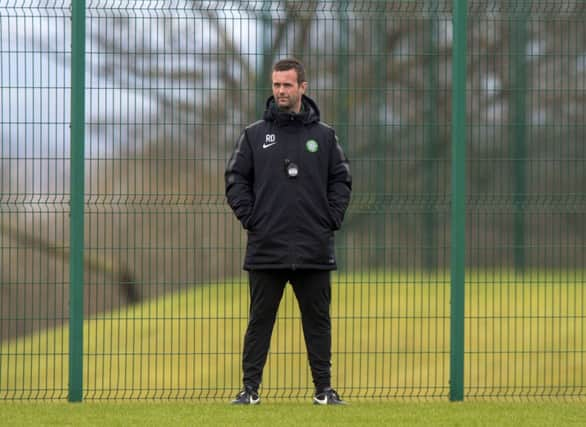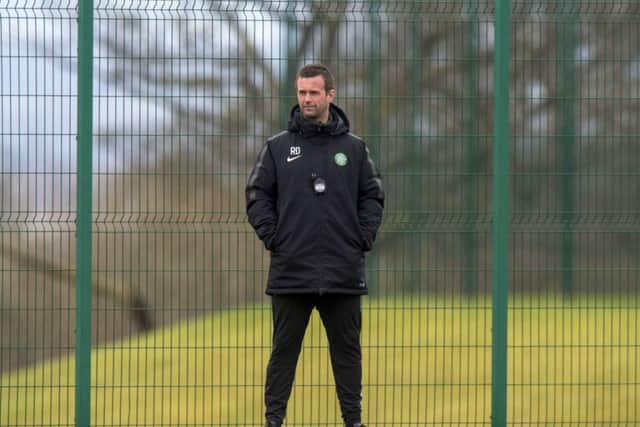Ronny Deila’s early Celtic days plagued with doubt


The contrast with the early stages of his first season at the club could not be more acute. Then the fun never seemed as if it was going to start. And as two bites at Champions League qualification proved to be poisoned fruit and some rotten domestic performances followed, Deila was crossing off the days as if he were a man in captivity.
Yesterday at Lennoxtown, more candidly than ever before, the Norwegian admitted the sense of being caged by the circumstances that surrounded his appointment as successor to Neil Lennon had him giving thought to breaking free.
Advertisement
Hide AdAdvertisement
Hide Ad“There was a period when I doubted whether I wanted to do it,” Deila revealed of his Celtic post. “I felt it was a little unfair at times. I’ve always said I want to build things, create things. When you come in and everything is result, result, result, it’s tough to think how you are going to fix this in the right way. If it’s only about results it’s not fun. If I have to go in and think ‘I can’t make mistakes today’ there’s no development there.


“But we’ve got past that stage and we are really getting better and better and the culture’s getting better. We have so much I want to do still and that makes me excited. But in the beginning, when I wanted to build a foundation, I didn’t find the land where it was going to stand. It was very tough to start with.
“The first two to three months were like that. But in every game I saw something in terms of improvement. We had some results that were OK, we didn’t lose so many games. But win or lose, it was the same. We played Dundee away [in late August], 1-1, and we couldn’t play worse than we did. It was unbelievably bad. You know what the players want but you just haven’t got the message across. People are insecure and that’s a hard time for the coach and the players. You just have to be clear in what you want and where you want to go. When people feel safe in their roles it develops, now you can see when they go on the pitch, they’re confident they’ll win and they know what’s expected.”
Deila prevailed in no small part because of the support structure he says was provided by those at the club; and at his side. “I had unbelievably good back up from Peter, John, John and Stevie Woods as well,” he says, referring to assistant John Collins and first-team coach John Kennedy, along with goalkeeping coach Woods and chief executive Peter Lawwell. “I’m a very open person, I say it as it is and I do that with them as well. My staff has been very good and helped me a lot. We’re growing more together, I’ve learned from them, they’ve learned from me and hopefully we know where we want to go. That’s fun and that gives you energy. That’s why I love to be here.” He doesn’t believe there was a significant language barrier nor were the players resistant to his exacting methods. “I spoke English at one [early meeting], I’d a one-hour speech to them about how I wanted things. I think that went quite well. But I didn’t know anything about Scottish football. I didn’t know anything about the players. I’d had a full season with my old club and five days later I was ready for Celtic. I didn’t know more than four names in the squad so it takes time to get to know them then – bang – you’re in the Champions League and playing games all over Europe, so I was in a situation I had to manage. I didn’t know what they had done before so it was very complicated. John and John were really helpful.
“The players really wanted it and there were no problems at all. But my way of playing is quite difficult. It’s not straightforward, and when it becomes too much it’s hard for them to think about it, it has to come automatically. That takes time. It’s so important to understand if you go back to the big managers they had before, Neil [Lennon] and [Gordon] Strachan, they also struggled in the beginning. It’s not only me. Peter was saying that the whole time: ‘Relax, you’re not the first, we’ve been through this before’. But it’s harder for a Norwegian guy coming in, who’s unknown, as opposed to someone coming in with a big name.”
It is still hard for a Norwegian guy when confronted by Scott Brown yammering in his thickest Fife accent. Mind you that is hard for many Scottish guys, too. “Broony is one of the hardest [laughs],” said the Celtic manager of his captain who is suspended for the visit of the Maryhill side this evening. “He is so quick. Half the time I just try to laugh at the right moments. But I am getting to understand more.
“I’ve never been a good learner in language, but now I feel more comfortable with the vocabulary, I feel I can express myself better. Before it was always the same words I was using. But I’m looking forward to speaking like every Scot! I don’t find it hard to understand Scots people. 70 per cent of you are fine but 30 per cent of you is very hard.”
FOLLOW US
SCOTSMAN TABLET AND MOBILE APPS